If you’ve ever searched for “best WordPress page builder,” you’ve probably seen these three names pop up everywhere: Elementor, Divi, and SeedProd. They all promise drag-and-drop simplicity, stunning designs, and code-free customization.
So does it really matter which one you choose? 🤷
At WPBeginner, we use SeedProd for our own projects (yes, it’s part of our family of products!), but we know it’s not the perfect solution for everyone. Each builder has its own strengths, and the “best” choice really depends on your specific needs.
In this detailed comparison of Elementor vs Divi vs SeedProd, we’ll cut through the marketing hype and show you where each builder truly excels, which one is actually easier to use, and how they compare in terms of performance and value.
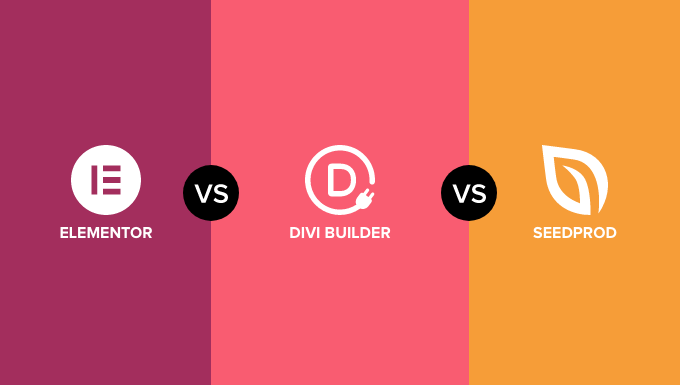
Elementor vs Divi vs SeedProd: A Brief Overview
When it comes to drag-and-drop page builders, these three tools consistently rank among the most popular options. Here’s a quick comparison to help you understand their key differences:
| Plugin | Users/Installs | Key Features | Free Version? | Starting Price |
|---|---|---|---|---|
| Elementor | 18+ million | • Advanced drag-and-drop builder • 100+ design templates • Real-time design | ✅ | $4.99/month |
| Divi | 970,000+ | • Visual front-end editing • 250+ layout packs • Built by Elegant Themes (15+ years) | ❌ | $89/year |
| SeedProd | 1+ million | • Theme-agnostic builder • 350+ templates • AI-powered design tools | ✅ | $39.50/year |
With that said, numbers and features only tell part of the story. Keep reading for our detailed, hands-on analysis of each page builder to understand which one might be the best fit for your specific needs.
We’ve broken down our comparison into the following sections:
- User Interface
- Customization Options
- AI Features
- Site Speed and Efficiency
- Third-Party Integrations
- Customer Support
- Value for Money
- Elementor vs. Divi vs. SeedProd – Which One Should You Use?
Why Trust WPBeginner?
Since 2009, WPBeginner has been helping millions of WordPress users build better websites. We’ve created hundreds of landing pages for our own products, built countless WordPress sites through our WPBeginner Pro Services, and worked with page builders daily in real-world scenarios.
For this comparison, we used the premium versions of all three plugins to ensure we could evaluate every feature and integration they offer.
For more about how we evaluate WordPress tools, see our editorial guidelines.
User Interface
When it comes to choosing a website builder, it’s important to select a tool that’s beginner-friendly and designed for non-tech users.
It should allow you to completely customize your WordPress theme and landing pages easily, without needing to edit any code.
Let’s see how these 3 builders stack up for ease of use.
Elementor – Ease of Use
Elementor offers a drag-and-drop theme and landing page builder. It provides different elements in a menu on your left, so you can quickly drag and drop them onto your template.
You can also enable a responsive mode, which lets you switch from a desktop view to a tablet or mobile view. This helps in editing your theme for different devices.
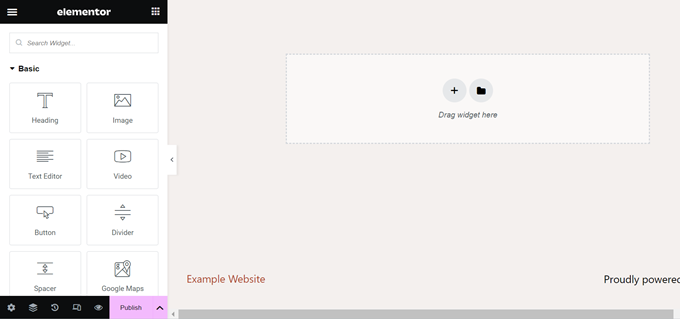
The builder can be overwhelming for beginners at first. In fact, we spent a pretty long time just exploring all the options when we first used it. There are a lot of elements to choose from, and clicking on any element on the template opens several more options for customization.
However, once we got the hang of it, Elementor’s website builder was easy to use.
It even features a powerful History panel where you can undo or redo changes with a single click, similar to using Ctrl+Z.
While this is powerful, we found SeedProd’s streamlined revision history slightly more intuitive for absolute beginners, as it shows a simple, linear list of your saves.
Divi – Ease of Use
Divi also offers a drag-and-drop builder to edit the Divi WordPress theme and change the layout of your landing pages without editing code.
What makes Divi’s builder different is that it lets you edit the WordPress website on the front end. It works by showing your design in real time so you can see exactly what each element looks like.
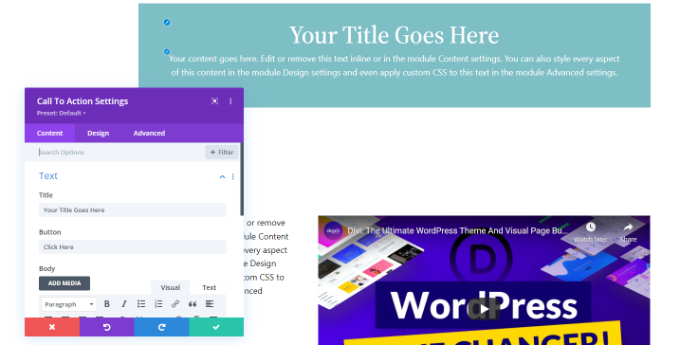
Unlike Elementor or SeedProd, you don’t get a menu containing different elements like text, images, videos, or buttons to add to the template.
Instead, Divi lets you select the layout of the section you want to add and then allows you to choose the element you’d like to add.
Because of its unique system, it took us a while to feel fully comfortable with Divi. That being said, it became fairly straightforward to use later on.
SeedProd – Ease of Use
SeedProd’s drag-and-drop website builder is very easy to use as well. It is a theme-agnostic plugin that lets you create your designs from scratch. Theme-agnostic here means you can edit the site without being limited by the theme’s design.
This is a huge advantage because it means you won’t have to ‘fight’ with your theme’s default fonts, colors, or layouts to get the exact look you want.
The theme-agnostic nature is a game-changer for us. This allowed us to create a custom page exactly how we wanted it to be without fighting against the existing theme’s limitations.
You can add different elements from the menu on your left by dragging and dropping them onto the template.
Using SeedProd’s theme builder, customizing the way your site looks is effortless. It’s made for non-tech users and ensures that anyone can customize their theme without editing code.
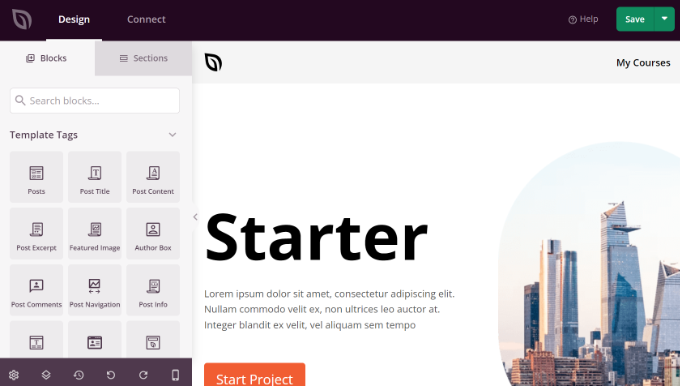
You can also see the revision history and revert previous changes with a click of a button. There’s also a draft mode, which lets you edit a page privately without revealing it is under maintenance.
The builder is also quick and designed with speed in mind. It doesn’t bloat or slow down your website.
SeedProd also lets you add a coming soon page, maintenance mode, and 404 error landing pages with ease. This way, you can create buzz around your upcoming website or tell search engines that your site is currently under maintenance.
Winner – SeedProd
After testing all three plugins, we found that SeedProd, Elementor, and Divi all offer an impressive no-code website builder experience.
However, we found SeedProd’s interface to be the most streamlined and beginner-friendly. Its revision history, in particular, is really straightforward, making it easy to undo changes and revert to previous versions without any guesswork.
This simplicity can save hours of work and potential frustration, making it our top pick for ease of use
Customization Options
Another important factor to look for when selecting a website or landing page builder is the level of customization that’s possible.
It’s important to choose a tool that gives you full control over the appearance of your themes and pages.
Here’s a look at the customization features offered by Elementor, Divi, and SeedProd.
Elementor – Customization Features
Elementor impressed us with its library of over 100 designer-made website kits. Simply pick a kit, add your content, edit its style, and make it your own. Using Elementor, you can control every aspect of your site’s appearance.
It offers templates for a wide variety of categories. For example, you can choose a template for a blog, eCommerce store, travel, tourism site, fashion blog, non-profit organization, education, and more.
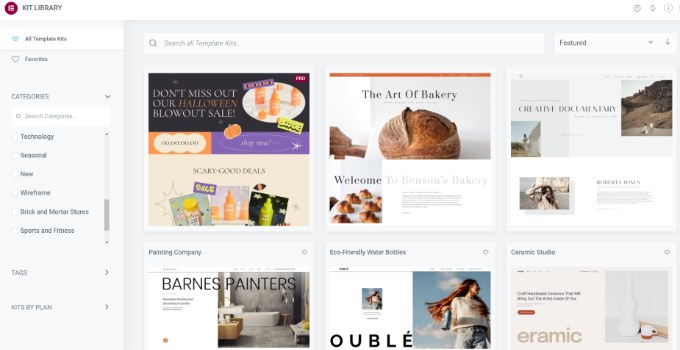
With Elementor, you get over 100 different widgets to add to your theme or landing page. These include basic widgets like headings and text, Pro widgets such as share buttons and countdown timers, and theme elements like post titles and WooCommerce widgets.
Other than that, Element also offers advanced customization features. For instance, you can add custom CSS to completely customize the appearance and styling of your site, add custom code, upload your own fonts and icons, and more.
Divi – Customization Features
Divi offers over 250 pre-made website layout packs for various industries.
You can choose from a full website pack to design your WordPress website. The pack includes templates for different pages like a blog section, about us page, contact page, homepage, and more.

Besides that, Divi offers dozens of website elements called modules for customizing your website theme and pages. For example, you can add sliders, call-to-action (CTA) buttons, forms, testimonials, galleries, and more.
We also enjoyed that you get full control over how each element looks. You can change the fonts, text color, border options, add hover styling, use filters and effects to enhance the appearance of any element, or use custom CSS to edit any element.
SeedProd – Customization Features
SeedProd’s 350+ different website theme and landing page templates provided us with the widest range of options. You can also choose from over 20 built-in color schemes or create your own from scratch.
Each website theme template is packaged with templates for multiple pages and sections, like the homepage, a single blog post, header, and footer.
However, what makes SeedProd different from Divi and Elementor is that it doesn’t rely on your WordPress theme for styling or functioning.
It works independently from your chosen SeedProd theme. This gives you complete control and freedom over the appearance and design of your theme.
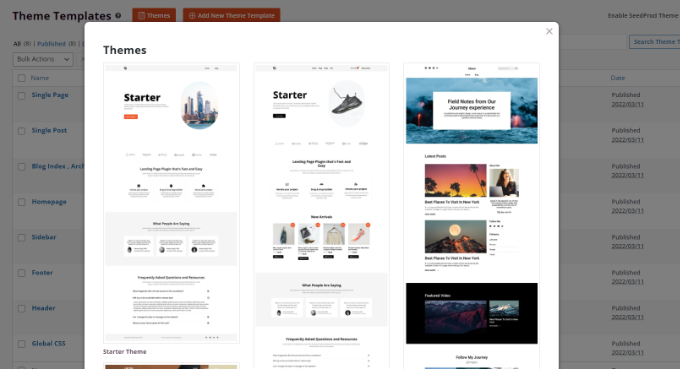
There are also over 90 different blocks you can use to customize your WordPress themes and landing pages further.
For instance, you can add a site logo, post navigation, headlines, and texts. Or, use advanced blocks like contact forms, optin forms, giveaways, icons, progress bar, and more.
Each block is further customizable. You can change its alignment, color, edit font size, change heading levels (H1, H2, H3, and so on), add image alt text, edit image size, and more.
SeedProd also offers WooCommerce blocks, so you can easily customize your WooCommerce store. It even integrates with Google Fonts to give you more options to customize your website.
Winner – SeedProd
Whether you choose Elementor, Divi, or SeedProd, each WordPress website builder offers a great range of customization options. You get to choose from multiple themes and landing page templates.
Plus, you can select any element on the template and further edit its style, color, and appearance. They also allow advanced customization options through custom CSS and custom code snippets.
AI Features
As artificial intelligence (AI) becomes increasingly important in web design, let’s examine how each builder uses artificial intelligence to enhance your website building experience.
Want a much more in-depth look into these tools’ AI features? Check out our expert picks of the best AI website builders for WordPress for more information.
Elementor – AI Features
Elementor’s AI toolkit focuses on enhancing specific WordPress design elements rather than generating entire websites.
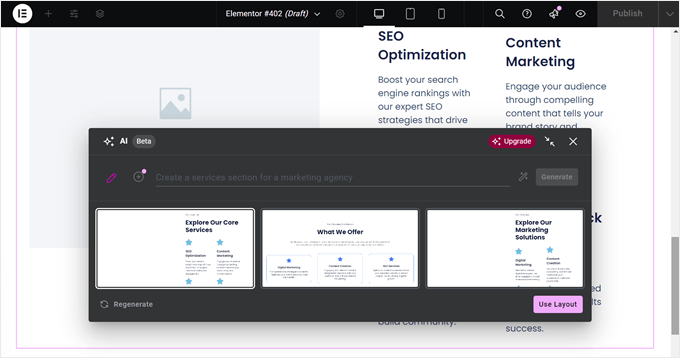
While testing their AI features, we found them particularly useful for:
- Content generation that adapts to your site’s context
- Smart layout suggestions based on your existing design
- Image enhancement and generation
- CSS code generation for custom styling
However, we noticed some limitations during our testing. The image generator sometimes struggles with creating realistic human features, and the CSS code generator often requires multiple attempts to achieve desired results.
While powerful, these tools feel more suited for users who already have some design experience.
Divi – AI Features
During our testing, we were particularly impressed with Divi AI’s image generation system.
Unlike many AI tools that struggle with human features, Divi AI produces remarkably realistic images, even managing to create fairly natural-looking hands (though you might still spot some slight irregularities upon closer inspection).

What sets Divi’s AI features apart is the ability to set brand preferences like color schemes and fonts before generating designs. This pre-customization saved us considerable time during the design process.
Their ‘Generate Automatically’ feature also stands out, creating contextually relevant images that match your content without manual prompting.
Other than that, the AI quick actions for content are particularly robust, offering options to:
- Improve existing text
- Adjust content readability
- Translate into different languages
- Modify tone and style
However, we found the initial learning curve steeper than expected as the interface isn’t as intuitive as some competitors.
SeedProd – AI Features
In our extensive testing, SeedProd’s AI capabilities have consistently impressed us with their speed and efficiency.

For one, the AI website builder can generate complete designs in roughly 10-40 seconds (though they quote up to 60 seconds), making it the fastest option we’ve tested.
What truly sets SeedProd’s AI apart is its ability to create high-quality AI-generated designs with minimal input. The system doesn’t overwhelm users with endless questions but still produces remarkably relevant and professional results.

We’ve also used SeedProd’s other AI features to:
- Create and enhance images
- Produce and modify content
- Translate content into over 50 languages
The only notable drawback we’ve encountered is that the AI website builder operates separately from the main plugin, requiring an extra step to export and import designs. However, the process is straightforward thanks to SeedProd’s user-friendly import/export tools.
Winner – SeedProd
After testing all three page builders’ AI features, SeedProd stands out as the best choice. While Elementor and Divi have good AI tools, SeedProd is faster, easier to use, and offers more features that work well together.
Whether you’re just starting out or you’re an experienced designer, you can quickly create complete websites, enhance images, and improve content with SeedProd’s AI tools. It simply gets the job done better than the others.
Site Speed and Efficiency
The performance of your WordPress site plays a vital role in getting more conversions and boosting search engine rankings.
A slow-loading website can lead to a poor user experience, which means people might leave your site before interacting with your landing pages. We’ve seen firsthand how even a one-second delay can significantly increase bounce rates and decrease conversions.
To test how Elementor, Divi, and SeedProd perform, we created a simple landing page with a headline, an image, and a button. Then, to test the page speeds, we used Google’s PageSpeed Insights tool.
That said, we’ll focus on the mobile page speed scores because Google now uses your site’s mobile version for indexing and ranking content.
Let’s see how each of these website builders performs.
Elementor – Performance
When we tested our landing page created using Elementor, the PageSpeed Insights tool showed an overall score of 90 for mobile. This is a great score and shows your site won’t slow down while using the builder.
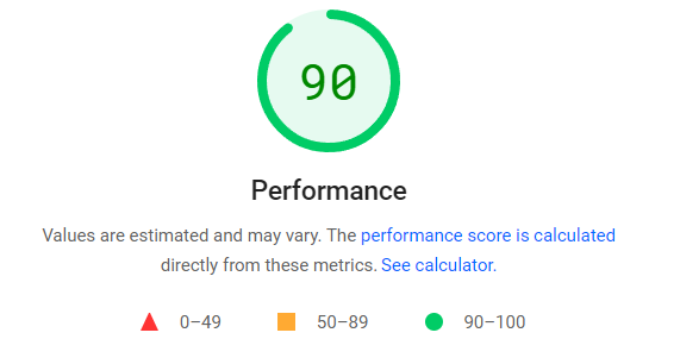
Divi – Performance
The score obtained using Divi’s drag-and-drop builder was also excellent. A 91 score means your website loads quickly, and you don’t have to worry about page load times when using Divi.
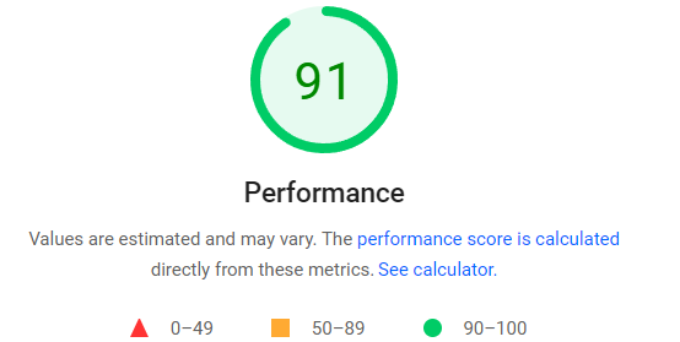
SeedProd – Performance
SeedProd’s page speed tests were slightly better than those of Elementor and Divi. With a score of 93 on mobile, you can expect fast performance and no delays in load time when using SeedProd.
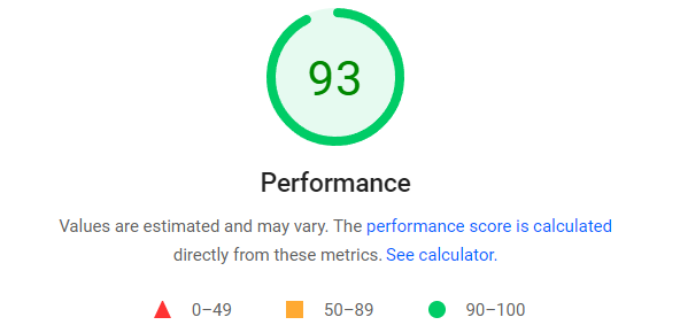
Winner – SeedProd
All 3 website builders performed well in our test, but SeedProd was slightly better than Divi and Elementor because it’s built with a speed-first mindset.
It helps you avoid bloated code, which generally leads to faster speed and page load time.
Third-Party Integrations
In our years of building WordPress sites, we’ve learned that a page builder’s value isn’t just in its core features, but also in how well it plays with other WordPress plugins and third-party tools. They can help you add more features to achieve your business goals.
For example, you can connect email marketing services to capture leads and build an email list, optimize your pages for search engines with SEO tools, or integrate social media networks.
Let’s see which tools and plugins are supported by Elementor, Divi, and SeedProd.
Elementor – Integrations
Elementor seamlessly integrates with different email marketing tools like AWeber, Drip, MailChimp, ActiveCampaign, Sendinblue, and ConvertKit. You can also connect customer relationship management (CRM) software such as HubSpot with Elementor.
Elementor also supports different WordPress plugins, including WooCommerce. You get different WooCommerce elements in the drag-and-drop builder as well.
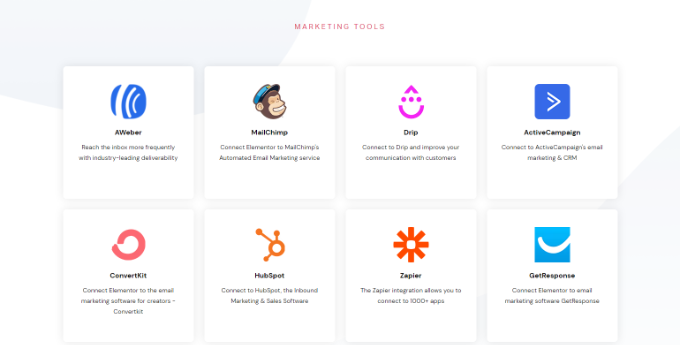
However, we did find the integration process a bit tricky at times. That’s because some integrations require you to go to the Elementor plugin settings page on the dashboard to connect it with the third-party tool. It’s not a deal-breaker, but it did interrupt our workflow.
That said, some integrations like Drip can be done inside the drag-and-drop builder. In that case, all you need to do is add a signup form in your WordPress theme or landing page template.
Only then will you be able to select your email service in the ‘Actions After Submit’ dropdown menu.
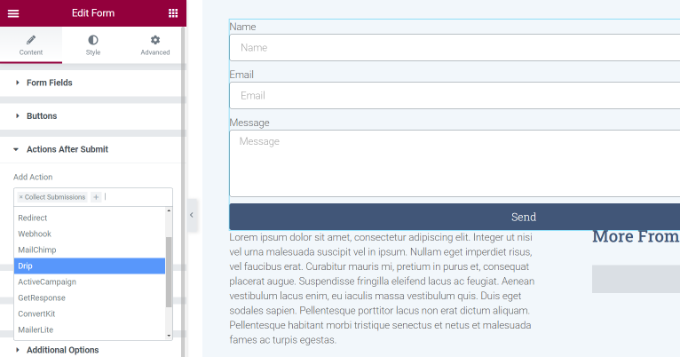
Besides that, it integrates with other eCommerce plugins like MemberPress.
Lastly, Elementor also integrates different social platforms like Facebook SDK, YouTube, Vimeo, Google Maps, SoundCloud, Slack, and more.
Divi – Integrations
Divi offers some integration options, just like the other two WordPress websites and landing page builders.
We’ve found its WooCommerce integration particularly robust. It offers different modules like add-to-cart buttons, cart notices, product ratings, and more. You can use these modules to create a WooCommerce store in WordPress.
Other than that, the tool lets you integrate Google Maps to show your location. It also works with the Wishlist Member plugin, Toolset plugin, and Hotel Booking plugin for WordPress.
As for email marketing platforms, Divi offers integrations with 20 different providers. However, for some services like Drip, the connection is managed through the Bloom plugin (which is included in the Elegant Themes membership) rather than directly inside the builder.
This adds an extra step to the setup process.
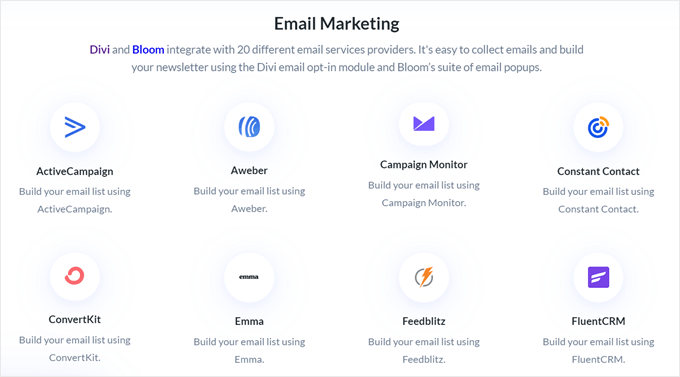
SeedProd – Integrations
SeedProd also offers a wide range of integrations with premium third-party tools and WordPress plugins.
For instance, you can connect it with Drip, Constant Contact, and other email marketing tools to collect and manage email subscribers.
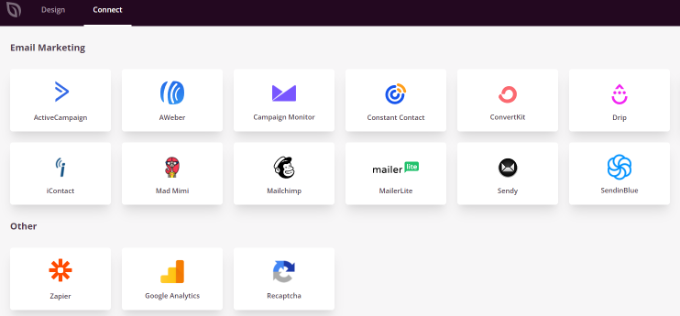
The WPForms integration has been a game-changer for many of our projects. We’ve used it to create everything from simple contact forms to complex survey systems, all seamlessly integrated into the page design.
Similarly, it also offers WooCommerce integration and lets you add WooCommerce blocks to your template.
Besides that, SeedProd integrates with Google Analytics and allows you to track website visitors. You can also connect it with Zapier and add Recaptcha to your landing pages.
What makes SeedProd different from Elementor and Divi is that it lets you connect any of these email marketing services within the theme or landing page builder. There’s no need to exit the drag-and-drop builder to enter the API key and connect your email marketing service.
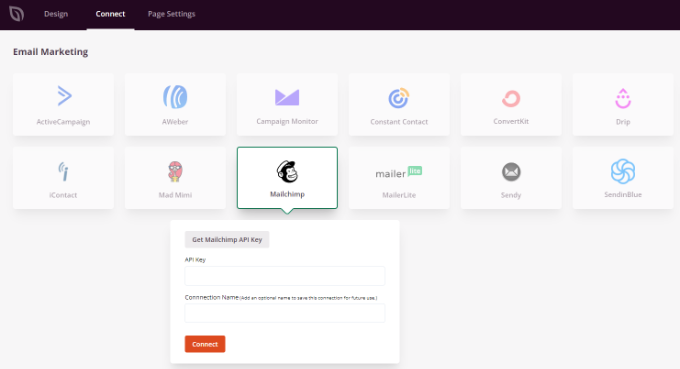
Winner – SeedProd
While Elementor and SeedProd both offer excellent integration options, SeedProd edges out the competition for us.
You don’t have to exit the theme or landing page builder to enter API keys. It shows different email marketing services under a separate tab inside the website builder. This removes the need to perform additional steps to integrate each service.
Customer Support
At times, you could get stuck or need help while using a WordPress website builder.
This is where having excellent customer support comes in handy. With the proper guidance and resources, you can resolve your issues and ensure the best results for your business.
Here’s how Elementor, Divi, and SeedProd stack up when offering support to users.
Elementor – Customer Support
Elementor offers multiple options for users who need help or need to contact customer support. They have a detailed and well-organized help center where you’ll find documentation on different topics.
For example, you can see steps for installation, how to create a new page, learn more about its features, how to use different widgets, and more.

Elementor also offers a guides and tutorials section where you’ll find multiple videos on different topics. You can even take courses and master using Elementor for various purposes, like building a portfolio or creating an online store.
If you’re an Elementor Pro user, then you get 24/7 premium support. Simply submit a support ticket, and a support representative will respond to your query.
Divi – Customer Support
Divi offers customer support through detailed documentation, including written steps and video tutorials. It also provides a community forum where you can interact with other users.
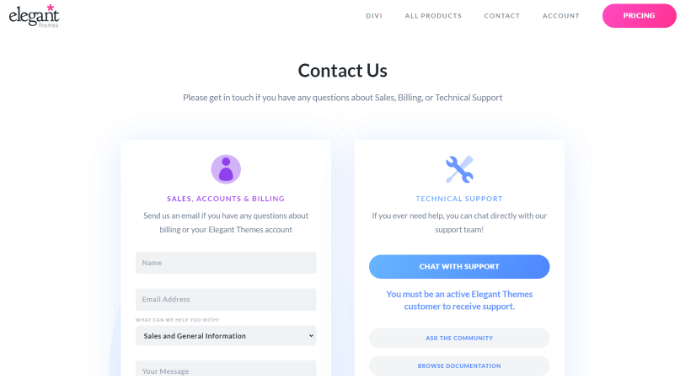
Another way Divi offers customer support is through support tickets and live chat. You can reach out to a customer support agent and resolve your problems through the live chat feature.
SeedProd – Customer Support
SeedProd offers customer support through a detailed knowledge base. You’ll find tutorials and guides for getting started, different features, and troubleshooting various issues.
The plugin also offers support through a ticketing system. You can open a ticket, and a team of WordPress experts will help you out.
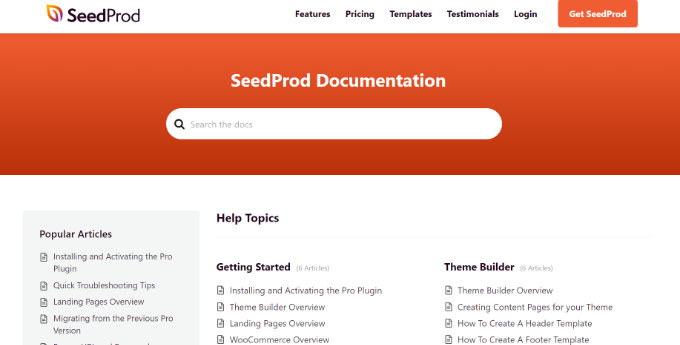
Since SeedProd is part of the WPBeginner family of products, you can join our WPBeginner Facebook Group for support. The group has over 83,000 members, and it’s a great place to ask for help.
Winner – Tie
All 3 WordPress website builders offer great customer support options. Elementor has lots of documentation, videos, courses, and more. Divi lets you chat with their support staff through live chat. Meanwhile, SeedProd offers detailed documentation and premium ticket support.
Value for Money
Another important factor you should consider when selecting a WordPress website builder is its pricing. Let’s look at the pricing plans offered by Elementor, Divi, and SeedProd.
Elementor – Pricing Plans
With Elementor, you get 4 pricing plans starting from $5.99 per month with their Essential plan. However, if you need to use Elementor on more than 1 website, then you can choose their Advanced plan for $8.25 per month,
There is also an Expert plan for $16.99 per month that lets you activate 25 websites.
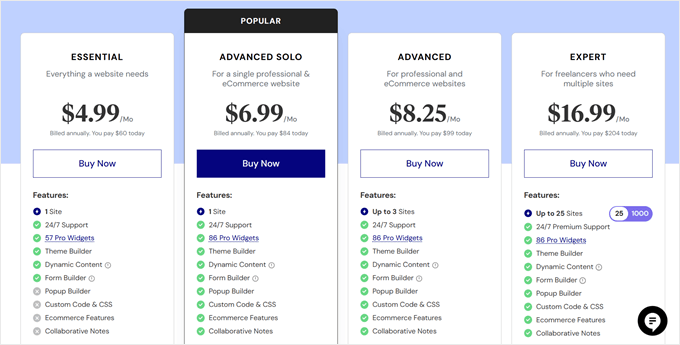
Elementor also offers a free version that you can use before subscribing to a premium plan.
Divi – Pricing Plans
Divi offers two main pricing options: a yearly subscription and a one-time lifetime payment.
- Yearly Plan: $89 per year
- Lifetime Access: $249 one-time payment
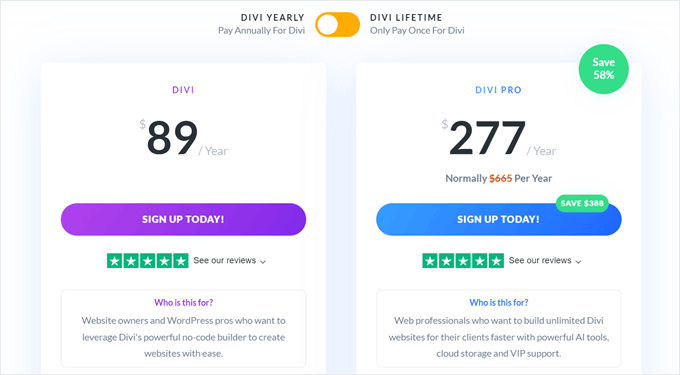
They also offer a Divi Pro package, which includes advanced features like Divi AI.
You can bundle Divi Pro with the lifetime plan, but access to the Pro features requires an ongoing annual fee after the first year.
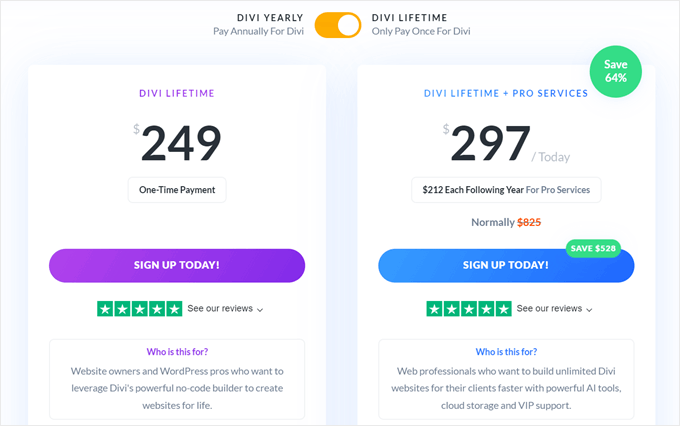
Unlike Elementor or SeedProd, Divi doesn’t offer a free plugin version.
SeedProd – Pricing Plans
SeedProd lets you choose from 4 different pricing plans. The Basic plan starts from $39.50 per year, and the Plus plan costs $99.50 per year.
However, if you want to use the theme builder, then you’ll need the Pro plan for $199.50 per year or the Elite plan for $239.60. With each plan, you get a 14-day money-back guarantee.
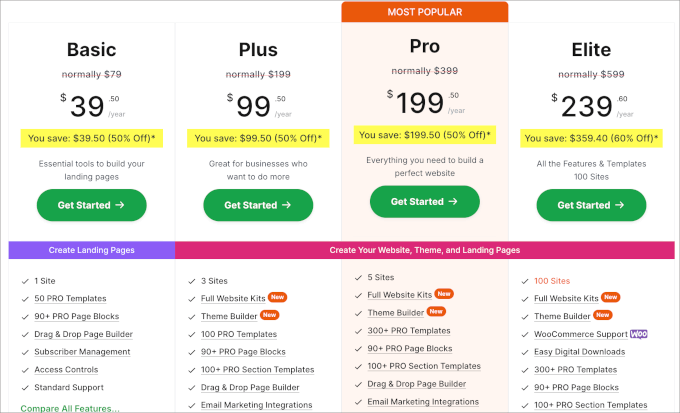
SeedProd also offers a Lite version, which is 100% free to use. However, it has limited features and doesn’t include the WordPress theme builder.
Winner – SeedProd
SeedProd offers affordable pricing plans compared to Elementor and Divi. Plus, you get more features and integrations with SeedProd, making it excellent value for money.
Elementor vs. Divi vs. SeedProd – Which One Should You Use?
After extensively testing all three page builders, we can confidently say they’re all capable tools.
Our recommendation: While each builder has its strengths, we believe SeedProd offers the best overall package, especially with its AI capabilities and ease of use. It’s what we use ourselves for most projects.
That being said, the key differences will likely determine which one is right for you. Here’s what matters most:
- Speed: SeedProd consistently performs fastest, followed by Divi, then Elementor
- Ease of Use: SeedProd is most beginner-friendly; Elementor and Divi have steeper learning curves
- AI Capabilities: SeedProd offers the most user-friendly AI tools; Divi excels at AI images; Elementor’s AI focuses on specific design elements
- Customization: All three offer extensive options, but SeedProd’s theme-agnostic approach provides the most flexibility
- Value: SeedProd offers the most features at the lowest price point
We hope this comparison between Elementor vs. Divi vs. SeedProd helped you pick the best WordPress website builder. You may also want to see our expert picks of the best WordPress theme builders and our guide on how to edit a WordPress website.
If you liked this article, then please subscribe to our YouTube Channel for WordPress video tutorials. You can also find us on Twitter and Facebook.





Olaf
It’s a shame it’s not compared to the native block editor as well. I’ve tried both Elementor and DIVI. I didn’t enjoy working with DIVI; Elementor isn’t bad, but it’s slow. Over time, it seems to put a lot of strain on the website, requiring quality hosting and substantial resources. I don’t have experience with SeedProd, so I can’t comment on it. If I had to choose, I’d definitely start by learning what WordPress offers by default, which is the block editor. It’s likely the quickest and most effective option. If I were looking for shortcuts and something user-friendly, I’d probably go with Elementor since it has a large user base and tons of tutorials online to help you learn as much as possible. But for all builders, solid optimization and fast hosting are essential; otherwise, it’s not very viable in terms of site performance. And yes, I’ve handled many Elementor-based sites, and if it’s not done well, the results are poor.
Mohamed El kacimi
The reader unfamiliar with the credibility of WPBeginner might assume bias towards SeedProd due to their affiliation. However, having previously worked with Elementor, I encountered difficulties in usability, performance, and pricing. Discovering SeedProd coincided with my exploration of WPBeginner months ago, prompting me to give it a chance. It proved to be a decision I will never regret.
Jiří Vaněk
I currently have a PRO plan on trial, and I’m just getting acquainted with it. Compared to Elementor PRO, there are many things here that are different for me, but I have to admit that the longer I work with Seed Prod, the better tool it becomes. I’ll probably end up switching from Elementor.
Moinuddin Waheed
I have used elementor quite often for my websites both the free and paid versions and found it very easy to use and customisation. the only thing at times that causes worry is, it makes the website speed slow and takes time to load.i have used generateblocks pro for making pages for my websites.
I have not used seedprod or divi page builders but as you have given the stats, seedprod is the winner in terms of lightweight and speed. I will definitely give it a try.
WPBeginner Support
We hope you like SeedProd should you decide to use it
Admin
Jiří Vaněk
I’ve grown most accustomed to the combination of Elementor and the GeneratePress template. I use it on my website and I can’t praise it enough. As for page builders, Divi hasn’t quite won me over, and so far, the best one seems to be Elementor in its PRO version (paid).
WPBeginner Support
Thanks for sharing your feedback
Admin
Uwe Twelker
Thanks! This is a great help in comparing the three website builders, a well thought out set of criteria.
I would like to add a little information to the pricing: If you own the Divi license, it’s valid for unlimited websites. So if my math is correct, if you use it for 3 or more websites you get your best price with Divi.
… and there are two more criteria for comparison I would like to propose – since I’m a Divi user I don’t have the respective information for the other two builders:
Environment: There are a lot of third party developers who offer child themes, plugins, modules … a lot of them can be found on the Divi Marketplace on the Elegant Themes website.
Another useful feature is the Divi Cloud. Here you can store layouts of whole pages, or just parts of pages like sections, rows, modules and so forth. And when working on your next project you can insert this layouts directly from the Divi Cloud into your layout. More information about the Divi Cloud on the Elegant Themes website.
Thanks again for your great work (I’m a regular reader!)
WPBeginner Support
Thanks for sharing your considerations for this comparison
Admin